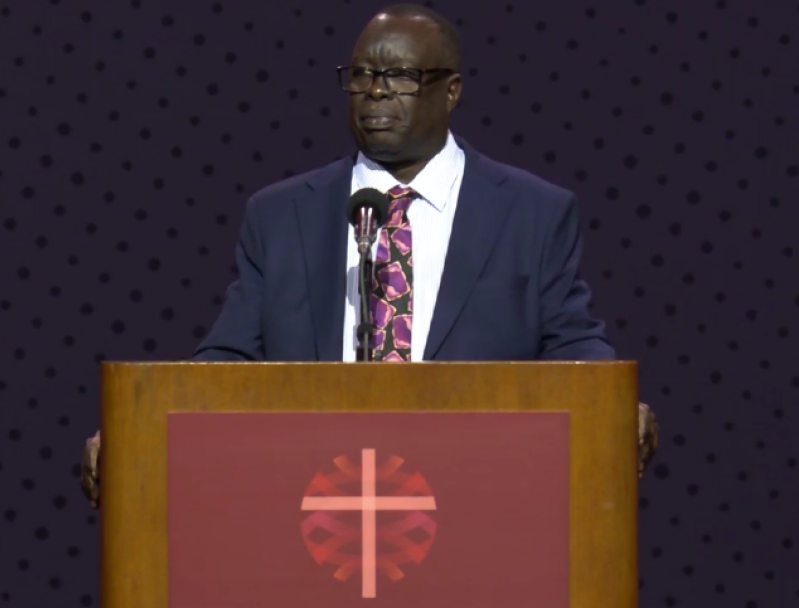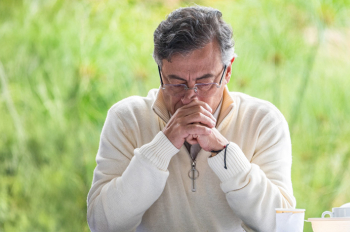
The presiding bishop of the African Inland Church James Lagos Alexander illustrated the transformative power of the Gospel through a personal journey of unwavering faith in the face of brutal persecution where being a “Christian was a crime” in Sudan especially during the civil war in 1983 - 2005. The northern government of Sudan had declared jihad against the largely Christian south, killing and arresting Christians and bombing churches.
Bishop Alexander recounted a powerful narrative of imprisonment, torture, and ultimately, triumph, at the just concluded European Congress on Evangelism in Berlin. He recalled a time when “churches had been bulldozed in our own eyes. Pastors jailed and beaten.” This didn’t deter him; instead, he and his colleagues took to the streets, proclaiming the Gospel fearlessly.
This courageous act led to imprisonment and torture. He described the harsh realities of African jails, stating, “you don't like to stay even one hour.” The beatings and torture were severe, yet Bishop Alexander and his fellow preachers never wavered.
An anchoring verse in James 1:2-3 that says Consider it pure joy, my brothers and sisters, whenever you face trials of many kinds because you know that the testing of your faith produces perseverance, helped Bishop Alexander and other Christian workers endure the imprisonment and torture for the sake of the gospel.
He recounted a reunion with a friend, a Pastor Jeremiah, whom he hadn’t seen in 30 years, since their shared experiences of imprisonment and torture in the 1990s. “We had been tortured together. We had been jailed together. We had been preaching the gospel together. We eat nothing sometimes. We spent nights without food, but for the sake of Christ Jesus,” remembered Bishop Alexander, highlighting the profound bond forged through shared suffering.
He emotionally recounted the moment he saw Pastor Jeremiah again, stating, “My friend, I thought you were dead. And he said ‘I'm alive’.” Pastor Jeremiah’s survival, against all odds, served as a powerful symbol of God’s protection.
Legacy of missionaries
Bishop Alexander also reflected on the legacy of missionaries who preceded him, many of whom died in Africa while spreading the Gospel. He acknowledged their sacrifices, stating, “They have gone to Africa in the middle of nowhere, in the jungles of South Sudan, they are preaching the gospel and many of them died there.” He saw himself as a fruit of their labor, a testament to the enduring impact of their dedication.
“Coming here into this congress, I said, 'God, thank you.' Because I have come to tell you, if your father or your grandfather died in Africa as a missionary, today, I'm here to tell you I'm one of the fruits that God has raised.” He echoed the missionaries’ unwavering commitment: “They keep saying in Africa, they say if we die, we die, but Africa must receive the gospel.”
The persecution intensified, leading to a period of profound loneliness and despair. Bishop Alexander described a time when, “Pastors were all locked in. Missionaries chased out. Christian churches bulldozed down. We felt lonely. Many people were dying. Nobody cared, we prayed and cried, and the persecution intensified. At times, we felt that God was not listening to us,” remembered Bishop Alexander. The intensity of the suffering almost led him to consider quitting, but a call from a friend, Gary Lundstrom, changed everything.
Lundstrom’s call, and the subsequent arrival of Rev. Franklin Graham, brought a turning point. Graham, despite the dangers, came to Sudan at the invitation of the then President Omara al-Bashir whose regime was persecuting Christians. Importantly, Graham made it clear he was a guest of the church, not the president.
This bold stance allowed him to act as an advocate for the persecuted Christians. Bishop Alexander and his fellow pastors presented a list of demands, including a request to stop the destruction of churches and the imprisonment of pastors. Remarkably, the president agreed to allow the rebuilding of the destroyed churches. The result was the construction of over 500 churches across Sudan.
Bishop Alexander concluded his account by emphasizing the importance of unwavering commitment to the Gospel, regardless of the cost. He highlighted the transformative power of the Gospel, citing the example of a formerly impoverished and alcoholic elder in his church whose life was radically changed by faith.
This elder’s joy and resilience, even in the face of extreme poverty, impacted a wealthy neighbour who, witnessing their faith, eventually sought out the church. This story underscores Bishop James’s central message: the Gospel’s transformative power extends beyond individual lives, impacting entire communities and even those who initially opposed it. The Bishop urged the audience to embrace the Gospel’s mission, regardless of the challenges and sacrifices involved.






